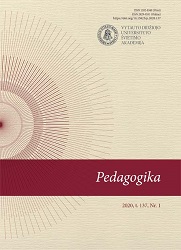Annotating Causal Discourse Markers ‘because’ and ‘so’ for Learning English as a Foreign Language
Annotating Causal Discourse Markers ‘because’ and ‘so’ for Learning English as a Foreign Language
Author(s): Giedrė Valūnaitė-Oleškevičienė, Sigita Rackevičienė, Nijolė Burkšaitienė, Liudmila Mockienė, Jolita Šliogerienė, Dalia GulbinskienėSubject(s): Education, Foreign languages learning, Syntax, Semantics, Comparative Linguistics, Translation Studies
Published by: Vytauto Didžiojo Universitetas
Keywords: causal relations; discourse markers; parallel corpus; cross-linguistic discourse annotation; translation; foreign language learning;
Summary/Abstract: This paper reports on an investigation of the functions of the English causal discourse markers ‘because’ and ‘so’ and their Lithuanian counterparts and analyses the Lithuanian translation equivalents of these discourse markers using the multilingual open translation project TED Talks as a data resource. The results revealed that the discourse marker ‘because’ and its Lithuanian counterparts express ideational cause, followed by its rhetorical equivalent. However, the discourse marker ‘so’ and its Lithuanian counterparts express rhetorical consequences, followed by the rhetorical specification.
Journal: Pedagogika
- Issue Year: 137/2020
- Issue No: 1
- Page Range: 193-207
- Page Count: 15
- Language: English

